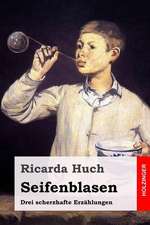Woodcutters
Autor Thomas Bernharden Limba Engleză Paperback – 19 sep 2019
LRB BOOKSHOP'S AUTHOR OF THE MONTH ONE OF THE GUARDIAN'S BEST BOOKS OF 2019WITH A NEW AFTERWORD BY ANNE ENRIGHT, AUTHOR OF THE ACTRESS'If you haven't read Bernhard, you will not know of the most radical advance in fiction since Joyce ...
| Toate formatele și edițiile | Preț | Express |
|---|---|---|
| Paperback (2) | 56.92 lei 26-38 zile | +18.39 lei 6-12 zile |
| FABER & FABER – 19 sep 2019 | 56.92 lei 26-38 zile | +18.39 lei 6-12 zile |
| Vintage Books USA – 31 iul 2010 | 85.80 lei 22-36 zile |
Preț: 56.92 lei
Preț vechi: 68.88 lei
-17% Nou
10.90€ • 11.84$ • 9.16£
Carte disponibilă
Livrare economică 04-16 aprilie
Livrare express 15-21 martie pentru 28.38 lei
Specificații
ISBN-10: 0571349994
Pagini: 192
Dimensiuni: 131 x 200 x 17 mm
Greutate: 0.16 kg
Ediția:Main
Editura: FABER & FABER
Descriere
LRB BOOKSHOP'S AUTHOR OF THE MONTH
ONE OF THE GUARDIAN'S BEST BOOKS OF 2019
WITH A NEW AFTERWORD BY ANNE ENRIGHT, AUTHOR OF THE ACTRESS
'If you haven't read Bernhard, you will not know of the most radical advance in fiction since Joyce ... My advice: dive in.' Lucy Ellmann
'I absolutely love Bernhard: he is one of the darkest and funniest writers ... A must read for everybody.' Karl Ove Knausgaard
An unnamed writer arrives at an 'artistic dinner' hosted by a composer and his society wife: a couple he once admired, but has now come to detest. They have been brought together by their friend Joana's suicide, but the guest of honour, a famous actor from the Burgtheatre, is late. As the guests await his arrival, little do they know that they are being subjected to the narrator's merciless scrutiny from his wing-backed throne, the targets of a tirade of epic, frenzied proportions. When the star actor finally arrives, he ushers in an explosive end to the evening that is impossible to see coming.
Originally banned in Thomas Bernhard's homeland, Woodcutters brutally exposes the hollow pretentiousness of the Austrian bourgeoisie in an unforgettable firework display of humour and horror - newly illuminated by Anne Enright's afterword.
Notă biografică
Extras
—Voltaire
While everyone was waiting for the actor, who had promised to join the dinner party in the Gentzgasse after the premiere of The Wild Duck, I observed the Auersbergers carefully from the same wing chair I had sat in nearly every day during the fifties, reflecting that it had been a grave mistake to accept their invitation. I had not seen the couple for twenty years, and then, on the very day that our mutual friend Joana had died, I had met them by chance in the Graben, and without further ado I had accepted their invitation to this artistic dinner, as they described the supper they were giving. For twenty years I had not wanted to know anything about the Auersbergers; for twenty years I had not seen the Auersbergers, and in these twenty years the very mention of the name Auersberger had brought on third-degree nausea, I thought, sitting in the wing chair. And now this couple is bringing me face to face once more with the life we led in the fifties. For twenty years I’ve avoided the Auersbergers, for twenty years I haven’t even met them, and then I have to run into, them in the Graben, I thought. It had been a piece of monumental folly not only to go to the Graben in the first place, but to walk up and down the Graben several times, as I was in the habit of doing, at least since returning to Vienna from London: it was a street where I might have known I would be sure to meet the Auersbergers one day, and not only the Auersbergers, but all the other people I had been avoiding for the last twenty or thirty years, people with whom I had had close ties in the fifties, what the Auersbergers used to call close artistic ties, ties which I had severed a quarter of a century ago, when I got away from the Auersbergers and went to London, breaking, as they say, with all my Viennese acquaintances of that period, not wanting to see them again or have anything more to do with them. Going for a walk in the Graben, I thought as I sat in the wing chair, means nothing more nor less than walking straight into the social hell of Vienna and meeting the very people I have no wish to meet, people whose sudden appearance brings on all kinds of physical and mental strains. Hence in recent years, whenever I came over from London to Vienna, I had chosen different routes for my walks, avoiding not only the Graben, but also the Kohlmarkt and, of course, the Kärntnerstrasse. I had avoided the Spiegelgasse, the Stallburggasse and the Dorotheergasse too, not to mention the dreaded Wollzeile and the Operngasse, where I have so often been trapped by the very people I most detest. But in recent weeks, I reflected as I sat in the wing chair, I had suddenly felt an urgent need to go to the Graben and the Kärntnerstrasse, because the air there was healthy, and because I suddenly found it pleasant to mingle with the morning crowds, both in the Graben and in the Kärntnerstrasse, and no doubt also because I wanted to escape from the months of solitude in my Währing apartment, to get away from the isolation that had begun to deaden my brain. In recent weeks I had always found it relaxing, both mentally and physically, to walk along the Kärntnerstrasse and the Graben, then back along the Graben and the Kärntnerstrasse. Walking back and forth like this was as beneficial to my mind as it was to my body, and in recent weeks I had walked up the Kärntnerstrasse and the Graben and back every single day, as though there were nothing I needed so much as just to walk up and down the Graben and the Kärntnerstrasse. It was in the Kärntnerstrasse and the Graben that I suddenly recovered my vitality and became myself again, after months of what I can only describe as mental and physical debility; walking along the Kärntnerstrasse and the Graben and back I felt refreshed. All I need to do is to walk up and down like this, I would think to myself, though that was not all I needed. Just to walk up and down, I kept on telling myself. And in fact it did enable me to start thinking again, even to philosophize, to take an interest once more in philosophy and literature, which had for so long been suppressed, even killed, within me. It was a mistake, as I now realize, to spend the winter in Vienna and not, like previous winters, in London, I thought, sitting in the wing chair. It was this long, sickening winter that killed off everything literary and philosophical there was inside me, and now I’ve made it all come back by walking up and down the Graben and the Kärntnerstrasse. And I actually attributed my Viennese mental condition, my restored mental condition, as I now felt able to call it, to the therapy I had first prescribed for myself in the middle of January, this Graben and Kärntnerstrasse therapy. This dreadful city of Vienna, I thought, having plunged me yet again into profound despair and utter hopelessness, has suddenly become the motor that enables my mind to function again as a living mind and my body as a living body; day by day I observed the progressive revival of mind and body, of everything inside me that had been dead during the whole of the winter; having blamed Vienna throughout the winter for my mental and physical atrophy, it was to Vienna that I now owed my restored vitality. I sat in the wing chair and silently paid tribute to the Kärntnerstrasse and the Graben, ascribing my mental and physical recovery solely to my Kärntnerstrasse and Graben therapy; and I told myself that I naturally had to pay a price for this therapy, and meeting the Auersbergers in the Graben, I thought, was the price of its success. It’s a very high price, I thought, but it could have been much higher; after all I could have met much worse people in the Graben, for the Auersbergers aren’t the worst people in the world, at least not the very worst. All the same it’s bad enough to have met the Auersbergers in the Graben, I thought, sitting in the wing chair. A strong person, with strength of character to match, would have declined their invitation, I thought, but I’m not strong and I’ve no strength of character: on the contrary I’m the very weakest person, with the very weakest character, and that’s what makes me more or less everyone’s victim. And again I reflected that it had been a grave mistake to accept this couple’s invitation: having resolved to have nothing more to do with them for the rest of my life, I cross the Graben, only to be accosted by them; they ask me whether I’ve heard about Joana’s death, about her hanging herself, and then I go and accept their invitation. I momentarily gave way to the most shameful sentimentality, I thought, and the Auersbergers immediately took advantage of it; they took advantage of the suicide of our mutual friend Joana, I thought, to issue their invitation, which I at once accepted, though it would have been wiser to turn it down. But I didn’t have the time, I thought, sitting in the wing chair: they came up on me from behind and told me what I already knew—that Joana had hanged herself at Kilb, at her parents’ home—and then they invited me to dinner, to a very artistic dinner, they stressed—all our friends from the old days. They’d actually begun to walk on ahead of me when they issued their invitation, I thought, and they were already a few yards in front when I said yes, accepting their invitation and saying I’d come to their dinner party in this hideous apartment in the Gentzgasse. They were carrying a number of parcels, paper-wrapped parcels from various well-known shops in the center of the city, and they were wearing the same English overcoats they had worn thirty years before for shopping expeditions to the city center. Everything about them was what is called shabby-genteel. Actually she did all the talking in the Graben: her husband, a composer in the Webern tradition as he is described, didn’t say a word to me, wishing to offend me by not speaking to me, I thought as I sat in the wing chair. They had said that they had no idea when Joana’s funeral at Kilb would take place. I had been informed that day by a childhood friend of Joana’s, just before I left home, that Joana had hanged herself. This friend, who runs a general store in Kilb, did not want to tell me over the telephone that Joana had hanged herself; she simply told me that she had died, but I told her outright that Joana had not died, but killed herself. She, as her friend, must know how she had done it, I said, but she simply would not tell me. Country people are more inhibited than townspeople about saying openly that somebody has killed himself, and they find it hardest of all to say how. I guessed at once that Joana had hanged herself; in fact I said to the woman from the general store, Joana hanged herself, didn’t she? She was taken aback and simply said Yes. People like Joana hang themselves, I said. They don’t throw themselves in the river or jump out of fourth-floor windows: they get a piece of rope, deftly tie a noose in it, attach it firmly to a beam, then let themselves drop into the noose. Ballerinas and actresses hang themselves, I told the woman from the general store. The fact that I had not heard from Joana for so long, I thought, sitting in the wing chair, had for some time struck me as suspicious, and I had often wondered lately whether Joana, a woman who had been deeply wounded, who had been cheated, deserted and scorned, might one day commit suicide. But in the Graben I had pretended to the Auersbergers that I knew nothing of Joana’s suicide, feigning utter astonishment and shock, even though by eleven o’clock in the Graben I was no longer astonished or shocked by the tragedy, having heard about it at seven o’clock that morning; after walking up and down the Graben and the Kärntnerstrasse several times I found I was able to endure Joana’s suicide, that I was able to bear it, in the bracing air of the Graben. Actually it would have been better had I not appeared utterly astonished by the Auersbergers’ announcement of Joana’s suicide; I should have told them that I had known about it for some time and that I even knew how she had killed herself. I ought to have told them the precise circumstances, I thought, and so deprived them of their triumph, which they were actually reveling in and savoring to the full, as I noted at the time while we were standing in front of Knizes’; for by pretending to know nothing whatever about Joana’s death, by acting as though I had been stunned and shattered and dumbfounded by the terrible news, I had allowed the Auersbergers the thrill of being the sudden bearers of ill tidings, which naturally had not been my intention, though this was what I managed to achieve by my ineptitude, by claiming to know nothing whatever about Joana’s suicide at the time of our meeting. All the time I was standing there with the Auersbergers I feigned ignorance, while knowing more or less everything about Joana’s suicide. I did not know how they came to know that Joana had hanged herself, but the likelihood was that they too had been told by the woman from the general store. She would certainly have told them what she told me, I thought, though not as much; otherwise the Auersbergers would have told me more than they did about Joana’s suicide. Of course they would be going to the funeral at Kilb, Auersberger’s wife said, and she said it in a way which suggested that it would not be a matter of course for me to go to Joana’s funeral; it was a kind of reproach, implying that I might possibly not go to Joana’s funeral, that I might even find it convenient to avoid going to the funeral of our mutual friend, even though, like them, I had been on terms of the most intimate friendship with her for so many years, indeed for decades. The way she said it, I thought, was actually insulting, as was the fact that, after saying she would see me at Joana’s funeral, she immediately went on to invite me to come to their so-called artistic dinner in the Gentzgasse the following Tuesday, that is, today, the day of Joana’s funeral. It was in fact through Auersberger that I had first met Joana thirty years before, at a birthday party given for her husband in the Sebastiansplatz, in the Third District, a so-called studio party attended by nearly all the well-known artists of Vienna. Joana’s husband was a so-called tapestry artist, a carpet weaver in other words, who had originally been a painter, and he had once won the first prize with one of his carpets at the Bienal in São Paulo in the mid-sixties. That Joana should commit suicide was the last thing they would have expected, the Auersbergers had said in the Graben, and before rushing off with all their parcels they told me that they had bought everything by Ludwig Wittgenstein, so that they could immerse themselves in Wittgenstein during the coming weeks. They’ve probably got Wittgenstein in the smallest parcel, I thought, the one dangling from her right arm. And again I reflected that it had been a grave error to accept the Auersbergers’ invitation, considering how I detest all such invitations, and how for so many years I had avoided invitations to artistic dinners of this kind, having attended so many of them until I was well into my forties. I was thoroughly familiar with what they were like—and I know of scarcely anything more repugnant. Actually these Auersberger invitations haven’t changed, I thought, sitting in the wing chair: they’re just the same as they were in the fifties, when they not only bored me to death, but drove me half demented. For twenty years you’ve detested the Auersbergers, I told myself, sitting in the wing chair, and then you run into them in the Graben and accept their invitation, and you actually turn up in the Gentzgasse at the appointed time. What’s more, you know all the others who’ve been invited to this dinner party, and still you turn up. And it struck me that I would have done better to spend this evening—or rather this whole night—reading Gogol or Dostoevski or Chekhov, rather than to come to this hateful dinner party in the Gentzgasse.
Recenzii
—The New York Times Book Review
“Musical, dramatic and set in Vienna, Woodcutters resembles a Strauss operetta with a libretto by Beckett. . . . Bernhard is easily the most original and important writer in German since Gunter Grass.”
—Chicago Tribune
“Bernhard’s narrators are prodigious haters, and yet we love them; they are too brilliant for it to be otherwise.”
—Salon
“No other book by Bernhard could possibly constitute a better introduction to his work as a whole. Apart from perfectly illustrating his shrewdness, disgruntlement and acute awareness, Woodcutters is very funny.”
—The Washington Post












